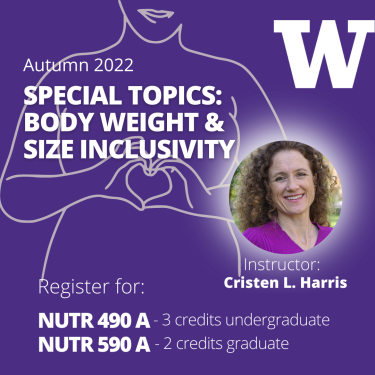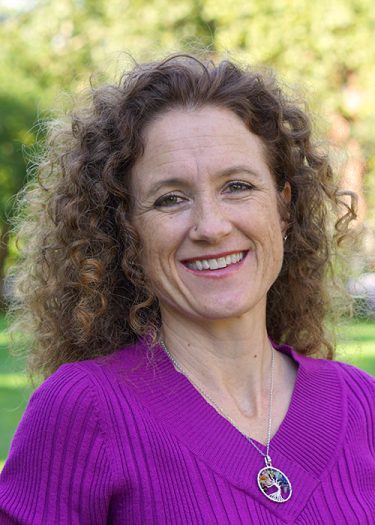New UW course explores how weight stigma affects health
University of Washington will offer a new course in autumn 2022 which will explore how the culture’s obsession with body weight affects health while exploring the evidence for size-inclusive approaches to health and well-being.
The new course is taught by Cristen L. Harris, an associate teaching professor in the Nutritional Sciences Program and Department of Epidemiology in the UW School of Public Health.
Register for:
NUTR 490/590 A – Special Topics: Body Weight & Size-Inclusivity: Clinical, Behavioral, and Societal Perspectives
- NUTR 490A – 3 credits, graded (undergraduate seniors)
- NUTR 590A – 2 credits, credit/no credit (graduate students)
No course prerequisites.
More About the Course

No eating after 7 p.m. No carbs at dinner. Hit 10,000 steps a day. Eliminate gluten, dairy, and soy. Try this new diet app. Eat less, move more.
According to market research statistics, Americans spend billions each year trying to change their bodies in the pursuit of health and/or happiness.
But does this relentless pursuit actually bring health and happiness… or harm?
In this seminar-style course, students will learn the history of our culture’s obsession with micromanaging our food and our bodies and the impact this may have on physical health, mental health, body image, and embodiment.
The course will explore the systemic, inequitable, and unjust ways in which bodies are oppressed and stigmatized under the guise of health, particularly among marginalized groups and amidst the intersections of socially constructed identities (e.g., race, gender, class, ability status).
Students will learn how weight stigma affects health while exploring the evidence for size-inclusive approaches to health and well-being.
About the Instructor

Cristen L. Harris is an assistant teaching professor in the School of Public Health at the University of Washington and a core faculty member in the Nutritional Sciences Program and the Department of Epidemiology.
Harris has always been fascinated by the challenges to developing a positive attitude about food and body including food insecurity, adverse childhood experiences, poor feeding dynamics, weight stigma, and disordered eating and exercise behaviors.
She is specifically interested in the size-inclusive Satter Eating Competence model and the Division of Responsibility in feeding and activity as parts of the puzzle in helping people experience joy throughout the lifecycle in eating, feeding, and moving their bodies.
Harris brings three decades of professional experience with roles as a clinician, educator, dietetics program director, mentor, and researcher. She is a member of several professional organizations including the International Association of Eating Disorder Professionals and the Sports and Human Performance Nutrition practice group, volunteer with Diversify Dietetics, faculty member of the Ellyn Satter Institute, and fellow of the Academy of Nutrition and Dietetics.
May 3, 2022